
| WWT Shows | CLICK TO: Join and Support Internet Horology Club 185™ | IHC185™ Forums |

|
• Check Out Our... • • TWO Book Offer! • |
Welcome Aboard IHC185™  Internet Horology Club 185
Internet Horology Club 185  IHC185™ Discussion Site Main Page
IHC185™ Discussion Site Main Page  Horological Discussions, Questions and Answers
Horological Discussions, Questions and Answers  Pocket Watch Discussions
Pocket Watch Discussions  B W Raymond Question
B W Raymond Question
 Internet Horology Club 185
Internet Horology Club 185  IHC185™ Discussion Site Main Page
IHC185™ Discussion Site Main Page  Horological Discussions, Questions and Answers
Horological Discussions, Questions and Answers  Pocket Watch Discussions
Pocket Watch Discussions  B W Raymond Question
B W Raymond QuestionGo  | New Topic  | Find-Or-Search  | Notify  | Tools  | Reply to Post  |  |
| IHC Life Member Certified Watchmaker |
I recently acquired this B W Raymond pocket watch S18 19J Ser No 14979310 grade 240 1909, which is I am happy to say running great and a super dial I love these Montgomery dials, now my question is about the hairspring ( please see the photographs) It seems like the hairspring is original is it a Breguet terminal curve?. This is a question for the real experts and out of my depth on this one, I do not know if Elgin ever tried a gold coloured (solid, low carat gold?) hairspring. I only know that the early Chronometer makers like Arnold and perhaps later Edw. John Dent experimented with gold hairsprings because it's not magnetic but they soon found out that it is too soft and will not perform well enough over a long period of time. It may also be a kind of special non-magnetic alloy. What you may not be able to see from the pictures is that it is a perfect fit for the regulator fork/pins or whatever you call them and everything on the watch looks original, can anyone shed any light on this interesting variation? is this common and I have just not noticed or worked on any of these it before. Chris A 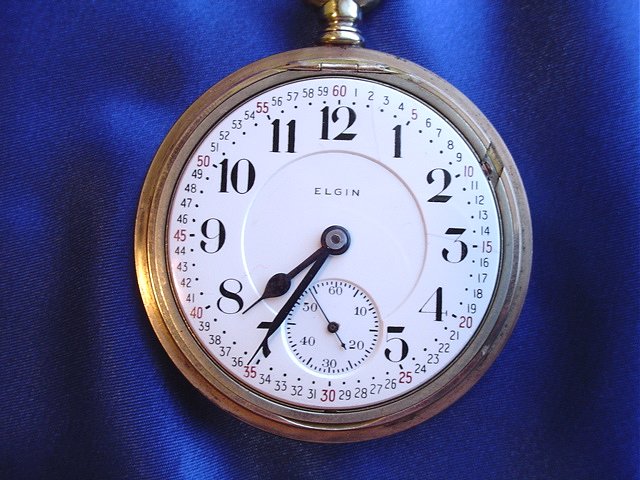 | ||
|
| IHC Life Member Certified Watchmaker |
P2 Chris A 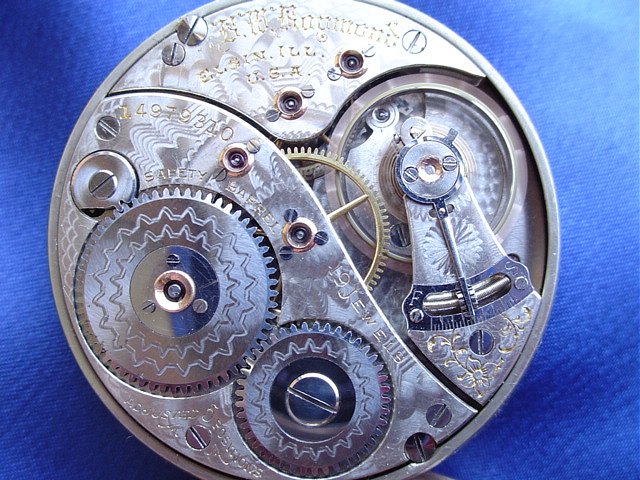 | |||
|
| IHC Life Member Certified Watchmaker |
P3 Chris A 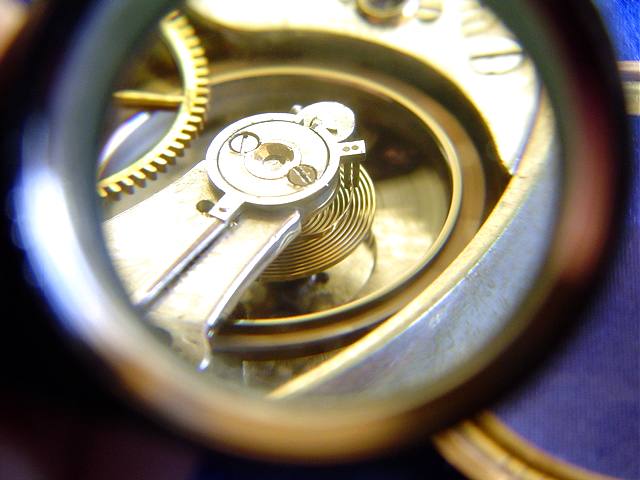 | |||
|
| IHC Life Member Certified Watchmaker |
P4 Chris A 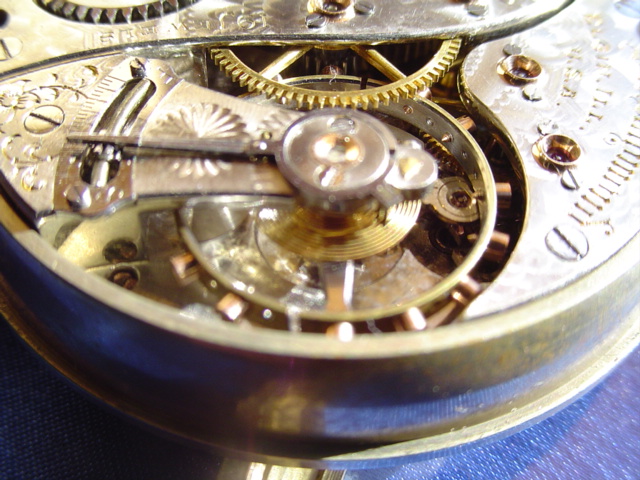 | |||
|
That hairspring is probably made from Elinvar Elinvar Word: WordStarts withEnds withDefinition Noun 1. Elinvar - Elinvar is a trademark for a kind of nickel-chromium steel used for watch springs because its elasticity is constant over a wide range of temperatures chrome-nickel steel alloy steel - steel who characteristics are determined by the addition of other elements in addition to carbon | ||||
|
| IHC Life Member RR Watch Expert |
If the hairspring is made of Elinvar, or any material whose elasticity does not change with temperature, then the hairspring is a replacement. Photo 4 clearly shows a bimetallic balance with cut rims. This will change the rate of the watch as the temperature changes to counteract the opposite changes generated by a steel, or one of the early "antimagnetic" hairsprings made of a Palladium alloy, which did change their elasticity as a function of temperature. I have seen a couple of these "gold" hairsprings over the years but I do not know who made them or what the composition is. The ones I have seen appear to be an exact match to the watch they were on and I have wondered if some hairspring vibrating firm may have ordered gold colored spring wire to make their product more distinctive, but that is pure speculation on my part. Ed Ueberall NAWCC 49688 IHC Member 34 The Escapement | |||
|
I have a 16s Father Time with the same gold hairspring and stud. I will try to get a photo up soon. Aaron | ||||
|
Hi, If your watch was made in 1909 it is to early to be an Elinvar HS. I believe that Elgin used Invar on their balances Elinvar was used by the Hamilton watch co. Either way these alloy hairspring didn't go into general use until the early 30's. I have seen other gold colored HS on Elgins. Here is one on a Veritas. I have never heard of hairsprings made of gold, but will leave that up to the real experts. Rob | ||||
|
Just a wild guess but I think someone did a light gold plating or wash on them! Kenny | ||||
|
I have sent Elgin Wayne an e-mail to see if he has any info on these. I'll keep us posted. BTW, I am of the opinion that the grade 240 is the finest 18s RR watch made. No frills just tough and classy looking. Remember, I'm a Elgin nut so dont chase me off. Aaron | ||||
|
| Watch Repair Expert |
The peculiar arrangement of the screws in the split compensation balance wheel rim makes me think the hairspring is probably original, but it is not Elinvar.......... Elinvar is white (like stainless steel), unless it's been plated or "dyed," which some were to make them look like blued steel. Many of the early white alloy hairsprings were extremely soft and didn't perform well, and I've read that when Elinvar was first introduced, watchmakers didn't like it because they assumed it would have the same characteristics as white alloy hairsprings of the past. In order to overcome that bias, Hamilton and perhaps other companies actually "dyed" their Elinvar hairsprings blue. In any event, there are LOTS of different hairspring alloys, and their colors cover most of the visible spectrum. My guess is that the one in question is probably either "Melius" or "X-A-M," but that's really just an "educated" guess. Don't ask me what the initials stand for, but both X-A-M and Melius are yellowish colored hairspring alloys that are designed to be used with split compensation balance wheels. They're both rustless and nonmagnetic, although they're also both variations of Elinvar, which itself was introduced in 1913. It'd be interesting to see if the bottom of the balance spokes are engraved with the same serial number as the movement. It's possible that the hairspring is made from an alloy with which I'm not familiar, or that the spring and wheel were both retrofitted to the watch at some date long after original manufacture. It's probably too big a coincidence for several people to have examples of similar watches with the same strangely colored springs, for them not to be original. Perhaps Wayne will have the answer from the old Elgin records......... ================== Steve Maddox Past President, NAWCC Chapter #62 North Little Rock, Arkansas IHC Charter Member 49 | |||
|
| IHC Life Member Certified Watchmaker |
Have enclosed photo and stamp and scribed serial number match. will be interesting to see if these hairsprings where used on certain runs only, or do you think they may have been salesmans specials like gold screw sets? Chris A 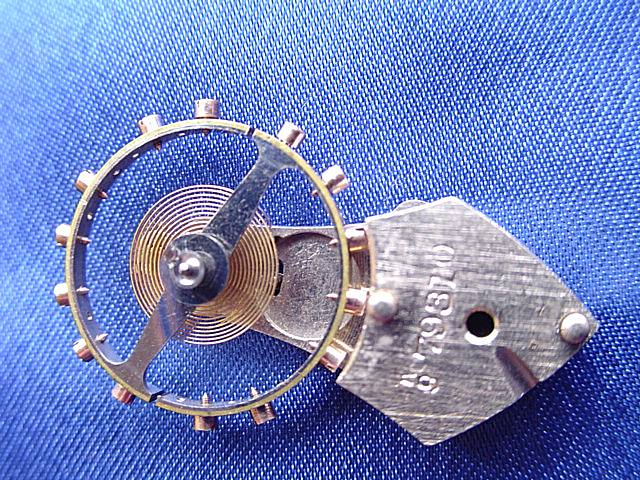 | |||
|
What made me think it was possibly gold-plated is the fact that the stud also appears to be of the same color. Like the whole thing was put in a solution and plated. If the collet is of the same appearance it would further confirm this. Still just guessing though! Kenny | ||||
|
| Watch Repair Expert |
Chris, I really don't know what to think, except that the arrangement of balance screws would be very unusual for a typical "adjusted" watch with a steel hairspring. That makes me think it probably isn't a steel hairspring, and that it's probably factory original. If someone in later years had changed the hairspring, it's doubtful that anyone who'd install an alloy hairspring on a compensation balance wheel, would actually go to the trouble to adjust the temperature compensation. The gold plated stud is probably just an additional indicator that the spring is something special, and not standard equipment. ============== SM | |||
|
| IHC Life Member |
Elgin's version of the Elinvar hairspring was called "Elginite" and patented in 1939. I'm not sure which watches received this hairspring. Maybe the early grade 571? John D. Duvall Vice President, Education | |||
|
In Rob's link above,the Veritas shown has a gold part of the balance cock encircled by the regulator,as well as the gold coloured h/s and stud-really pretty! However,the stud and spring is more of a brass colour than gold,as seen compared to the gold settings. Sam Williamson NAWCC 154312 IHC Charter Member 14 Member Chapters 96 and 185 | ||||
|
| IHC Life Member Certified Watchmaker |
can anyone shed any light on this, just a S18 7J but it has a strange Copper/rose gold color finish to the plates, black regulator and balance, also flat black hairspring, there was a large run of these 1/2 million, was this the normal finish?. Chris A 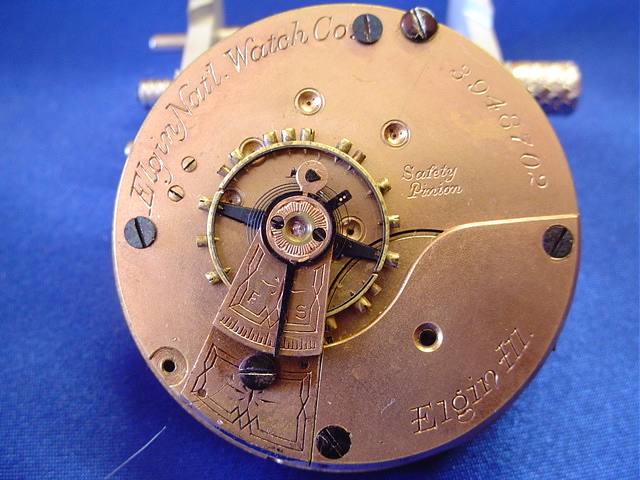 | |||
|
| IHC Life Member Certified Watchmaker |
The finish is not for the want of cleaning Chris A 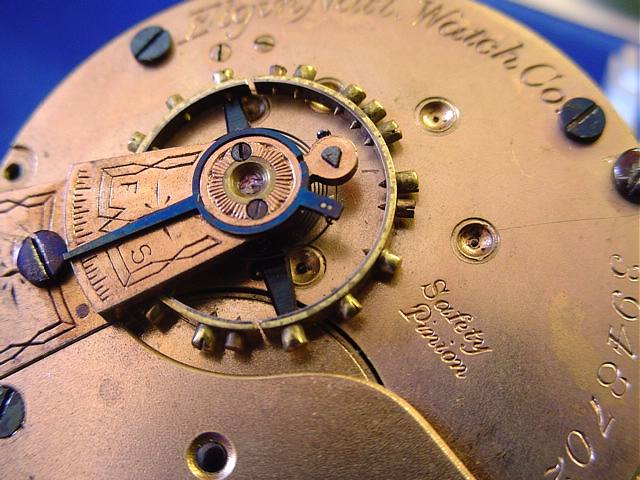 | |||
|
It looks to me like the steel parts were "tarnished" Somehow. I dont believe this to be a normal condition. The winding arbor looks black also. What do the arbors look like in the movement? Aaron | ||||
|
| IHC President Life Member |
Chris, I agree with Aaron in that what you're seeing is the "patina" these take on over time. Cleaning would likely restore brightness to gilded plates and more of a bluish look to the blued hardware. Lindell | |||
|
| IHC Life Member Certified Watchmaker |
Here you go looks like all the steel part are black finish????, was someone bored? the pictures dont show it very well but is a deep high quality finish, there are no areas that are unfinished as if it was tarnished, the arbor is all black also, has someone used a strange cleaning mixture on a FULLY stripped watch  | |||
|
| Watch Repair Expert |
I've seen a surprising number of watches like that over the years, and I think the topic has even been discussed here in the past. If the steel parts only got hot enough to "blue" them, but not hot enough to produce "fire scale," a dip in acid (such as toilet bowl cleaner, tile and grout cleaner, etc.) will restore their original polished appearance. If they got hot enough to produce "fire scale," however, it's a hopeless cause. Suggestion, remove the mainspring from the barrel and post an image of it. Unless it's been replaced (which is unlikely) it should expand into a circle about the size of a quarter. ===================== SM | |||
|
| IHC Life Member Certified Watchmaker |
Spring is broken but full size, check out one of the screws I took out it is blued all over far to well for a result of fire I think for a screw in place to be tarnished/heat treated, it came out easy, has a nice shiney finish also, I am inclined to think someone got board and blued all the watch parts, as you can see oil all over the movement. Chris A 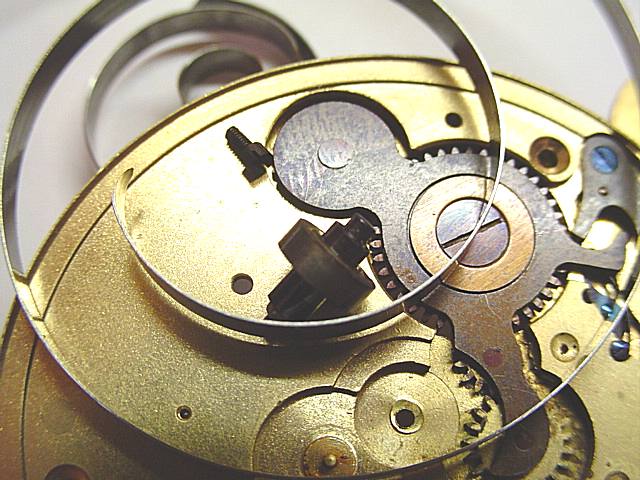 | |||
|
could be a cold blue on the parts to me... bored....they just wanted something different, or the majority of parts had heavy tarnish..... | ||||
|
The Elgin Watch Company book lists that movement as being Gilded. Frank Frank Juchniewicz | ||||
|
| Watch Repair Expert |
That particular movement probably started its life with blued screws, but I'd bet a lot of money that the strange colors on the rest of the steel parts and the plates are the result of fire damage. The mainspring appears to be white alloy, which wouldn't have lost its form with moderate heat exposure, the way an ordinary steel spring would have. White alloy springs don't break very often, but when they do, they usually break at odd angles, rather than in straight, clean lines, as blued steel springs usually do. What about the rest of the springs in the watch? Do they have normal tension, or are they all weak? What does the solder on the back of the dial look like, and is there any evidence of it having melted onto the front of the pillar plate? What about the shellac on the pallet and roller jewels? Does it look normal, or is it burned to a crisp? All of those factors should be considered in making a final conclusion about what happened to the movement above, but I'm 99.999% sure it's been in a fire. Trust me...... It isn't the only watch I've ever seen in that condition. ========================= SM | |||
|
Chris, FYI - I snagged a picture on ebay of an Elgin, 16s, 5 adj, Father Time with a "gold hairspring". The seller describes the hairspring as "killer gold hairspring! Stephanie O'Neil Pocket Watch Moderator NAWCC Member 143979 | ||||
|
| Watch Repair Expert |
======================== 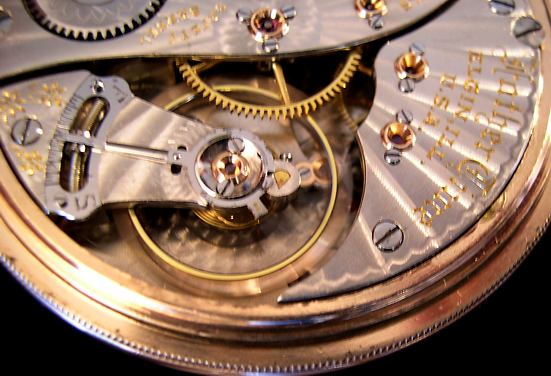 | |||
|
| Powered by Social Strata |
| Your request is being processed... |
|
©2002-2025 Internet Horology Club 185™ - Lindell V. Riddle President - All Rights Reserved Worldwide

